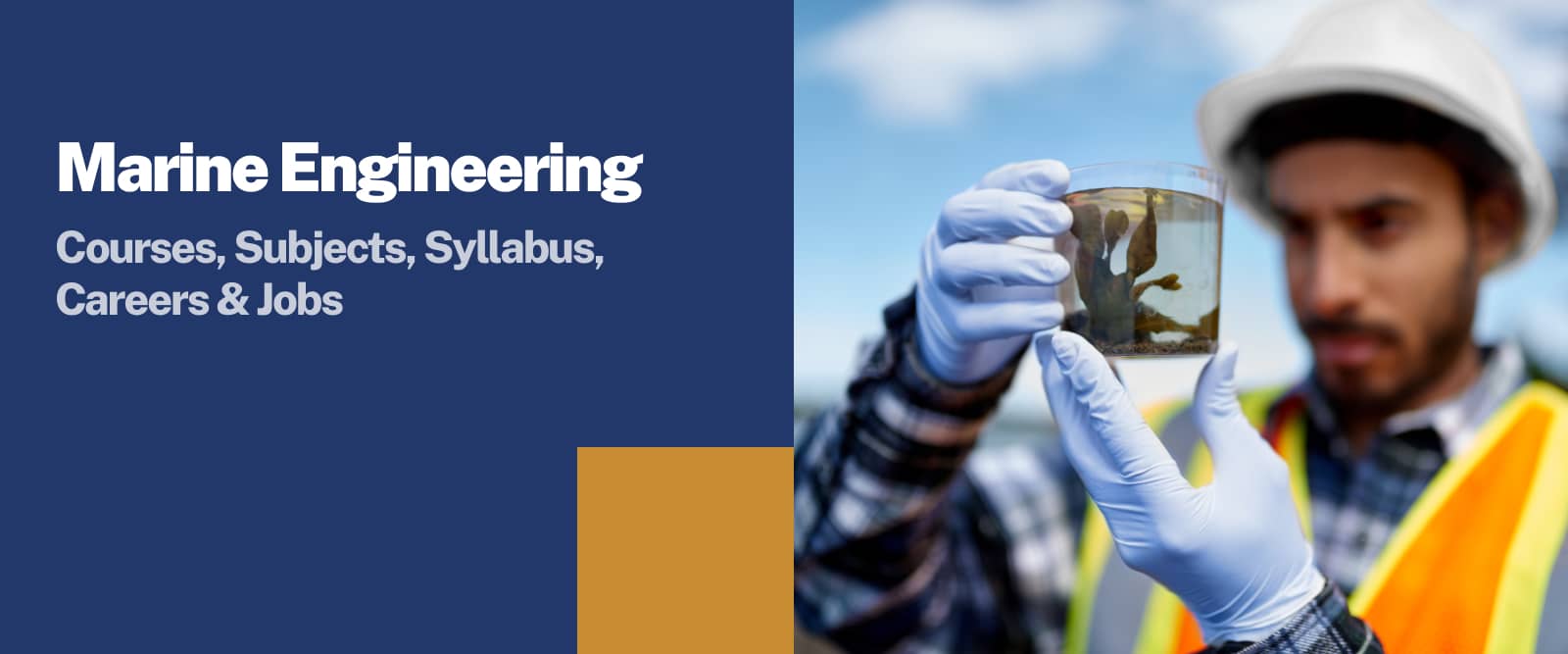5800 students unlocked their dream jobs with UG/PG programs in top colleges. Apply Now!
Marine engineering is a specialised branch of engineering that encompasses the design, construction, and maintenance of ships, boats, offshore structures, and other marine equipment. It involves a combination of mechanical, electrical, and naval architecture principles to ensure marine vessels' safe and efficient operation.
Marine engineers play a crucial role in the maritime industry, as they are responsible for creating innovative solutions to meet the ever-evolving demands of the industry, such as improving fuel efficiency, reducing emissions, and enhancing safety measures. Marine engineers combine their technical skills and creative thinking to bring new ideas to life, significantly impacting the global economy and the environment.
If you want to become a marine engineer, you can pursue a bachelor of technology in marine engineering. It is a rapidly growing field with a wide range of opportunities for those with a passion for innovation and a commitment to making a difference in the world.
Keep reading this blog to learn more about marine engineering qualifications and marine engineering course details.
[Also read: why choose B.Tech?]
Scope of Marine Engineering in India and Abroad
The scope of marine engineering in India is broad. In India, the maritime industry is growing at a steady pace, with increasing demand for marine engineers in shipbuilding, ship repair and maintenance, and offshore oil and gas exploration. Indian shipbuilding yards are expanding their capacity, and the government is also taking measures to promote the domestic shipping industry. This has resulted in numerous job opportunities for marine engineers in India.
Abroad, the demand for marine engineers is even higher, with a shortage of skilled professionals in the global maritime industry. Marine engineers have many opportunities in countries like the United States, the United Kingdom, Germany, Norway, and others. Marine engineers can work in shipbuilding and repair yards, shipping companies, maritime consulting firms, and government agencies.
The demand for marine engineers is also driven by the offshore energy sector's growth and the increasing focus on sustainability and environmentally friendly shipping practices. The marine engineering field is constantly evolving, with new technologies and innovations being developed to meet the changing needs of the industry, providing a rich and varied scope of work for marine engineers.
Eligibility to Pursue Marine Engineering
The eligibility criteria to pursue a UG degree in Marine Engineering typically includes —
- Education: A candidate must have completed 10+2 or equivalent examinations with Physics, Chemistry, and Mathematics as compulsory subjects.
- Entrance Exams: Most colleges accept the score of top engineering entrance exams like JEE Main, GATE, BITSAT, VITEEE, etc., for admission to their marine engineering courses.
- Minimum Percentage: A candidate must have obtained a minimum of 50% - 60% aggregate marks in their 10+2 or equivalent examination, although this can vary from institute to institute.
Here is the admission process for B.Tech in Marine Engineering-
- First, meet the eligibility criteria for admission to the program (educational qualification, age limit, and entrance examination requirements).
- Merit-based admissions will assess your class 12th results and marks.
- Entrance-based admissions will require you to clear national-level or university-level entrance exams and obtain the required cut-off marks.
Once you clear the admission requirement, submit supporting documents such as the mark sheet, test scores, and other required materials. Some colleges may also require you to appear in a GD and PI round to assess your candidature. After you are offered admission, make the final payment.
Marine Engineering Syllabus
A marine engineering UG course curriculum includes the following B.Tech subjects.
|
SEMESTER 1 |
SEMESTER 2 |
|
English Mathematics – I Basic Thermodynamics Basic Electrical & Electronics Engineering Engineering Mechanics - I Workshop Technology Geometrical Drawing Basic Electrical & Electronics Laboratory Workshop Practicals – I Communicative English Lab |
Seamanship, Elementary Navigation & Survival at Sea Mathematics – II Applied Thermodynamics – I Strength of Materials – I Computer Science Engineering Mechanics – II Engineering & Machine Drawing Applied Mechanics Laboratory Workshop Practicals – II Computer Laboratory – I |
|
SEMESTER 3 |
SEMESTER 4 |
|
Computational Mathematics Analog Electronics & Communication Applied Thermodynamics – II Strength of Materials – II Mechanics of Machines – I Electrical Machines – I Marine Engineering Drawing Electronics Laboratory Heat & Chemical Laboratory Workshop Practicals – III Control Engineering Laboratory |
Marine Boilers Digital Electronics & PLC Mechanics of Machines – II Electrical Machines – II Fluids Mechanics Marine Heat Engine & Air Conditioning Applied Marine Control & Automation Heat & Boiler Chemical Laboratory Computer Microprocessor & PLC Laboratory Workshop Practicals —IV |
|
SEMESTER 5 |
SEMESTER 6 |
|
Material Science Ship Structure & Construction Marine Internal Combustion Engine – I Fluid Mechanics Marine Auxiliary Machines – I Naval Architecture – I Elementary Design & Drawing Material Science Laboratory Vibration Laboratory & Fluid Mechanics Laboratory Marine Power Plant Operation – I |
Ship Fire Prevention & Control Marine Internal Combustion Engine II Marine Electrical Technology Marine Auxiliary Machines – II Naval Architecture – II Management Science & Economics Marine Steam Engineering Fire Control & Life-Saving Appliances Laboratory Marine Power Plant Operation —II Electrical Machines Laboratory |
|
SEMESTER 7 |
SEMESTER 8 |
|
Ship Operation & Management Advanced Marine Control Engineering & Automation IMO - Maritime Conventions & Classification Society Advanced Marine Technology Engine Room Management Elective Marine Machinery & System Design Simulator & Simulation Laboratory Technical Paper & Project |
On-Board Training & Assessment Voyage / Training Report Project on Environment & its Project Viva - Voce Elective |
List of electives
- Finite Element Method
- Remote Sensing Applications in Coastal Engg.
- Structural Design and Drawing
- Offshore Engineering
- Computer-Oriented Numerical Methods
- CAD of Marine Structures
Top Marine Engineering Colleges in India
|
Colleges |
Course Fee |
|
Academy of Maritime Education and Training |
₹3.45 lakh- ₹13.9 lakh |
|
AU |
₹60,000 |
|
C.V. Raman Global University |
₹3.3 lakh- ₹3.7 lakh |
|
Coachin University of Science and Technology |
₹54,500- ₹8.58 lakh |
|
IMU |
₹4.5 lakh- ₹10 lakh |
|
IMUC |
₹9 lakh |
|
NITK Surathkal |
₹1.4 lakh |
|
PCET |
₹2 lakh |
|
Rajalakshmi Engineering College |
₹1.5 lakh |
|
Shri Venkateswara College of Engineering |
₹2 lakh- ₹4.35 lakh |
Jobs After Completing Marine Engineering
After completing a B.Tech course in Marine Engineering, individuals can pursue careers in areas such as shipping companies, maritime engineering consulting firms, offshore oil and gas industries, naval architecture firms, and port authorities.
- Marine Engineer Officer in Merchant Navy (Avg. annual salary ₹10.5 Lakhs)
- Marine Superintendent (Avg. annual salary ₹30.9 Lakhs)
- Marine Consultant (Avg. annual salary ₹6.5 Lakhs)
- Shipping Company Manager (Avg. annual salary ₹5.7 Lakhs)
- Naval Architect (Avg. annual salary ₹5 Lakhs)
- Port Engineer (Avg. annual salary ₹4 Lakhs)
- Surveyor (Avg. annual salary ₹3.6 Lakhs)
- Marine Technical Superintendent (Avg. annual salary ₹30.9 Lakhs)
- Offshore Installation Manager (Avg. annual salary ₹90 Lakhs to ₹1 cr)
- Maritime Surveyor (Avg. annual salary ₹3.6 Lakhs)
Conclusion
Marine Engineering is a challenging and dynamic field that requires constant learning and adaptation to new technologies and advancements in the industry. This can be a rewarding and fulfilling experience for those who enjoy problem-solving and working in fast-paced environments.
So, when choosing a course and college to pursue a Bachelor of Technology in Marine Engineering, it is highly recommended to choose a college that offers Sunstone’s benefits. With Sunstone, not only does one gain exposure to industry-focused training, but also a chance to get internship opportunities to learn from industry experts.
FAQ - Marine Engineering
What problem do marine engineers solve?
Marine engineers have a crucial responsibility in the maritime industry. They create innovative solutions like improving fuel efficiency, reducing emissions, and enhancing safety measures. Marine engineers combine their technical skills and creative thinking to bring new ideas to life, significantly impacting the global economy and the environment.
What skills do marine engineers need?
Here is a list of essential skill or qualities that marine engineers must have. -
- Complex problem-solving skills
- Design skills and knowledge
- Knowledge of engineering science and technology
- Knowledge of physics
- Maths knowledge
- The ability to use, repair and maintain machines and tools
- Thinking and reasoning skills
- To be able to use a computer and the main software packages confidently
- To be thorough and pay attention to detail
HELP
Take the first step towards your dream job.
ABOUT THE AUTHOR


